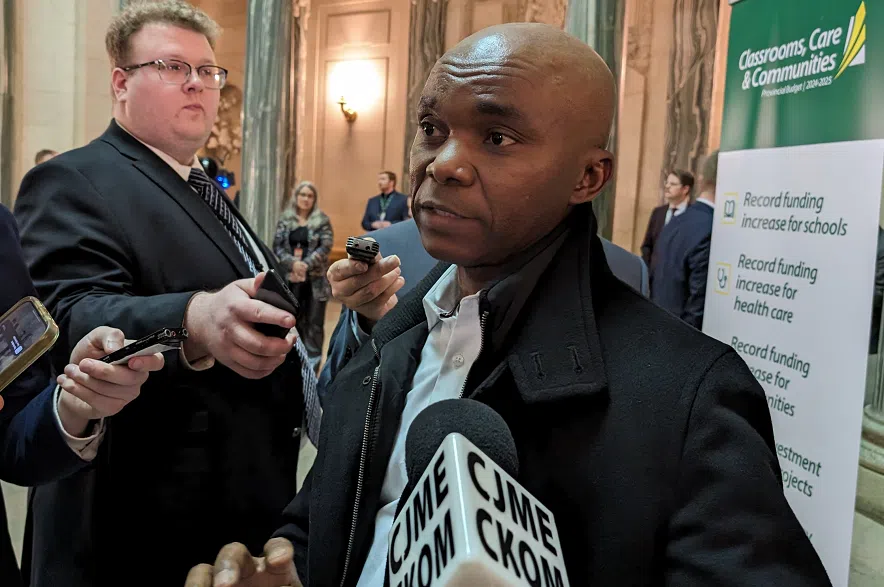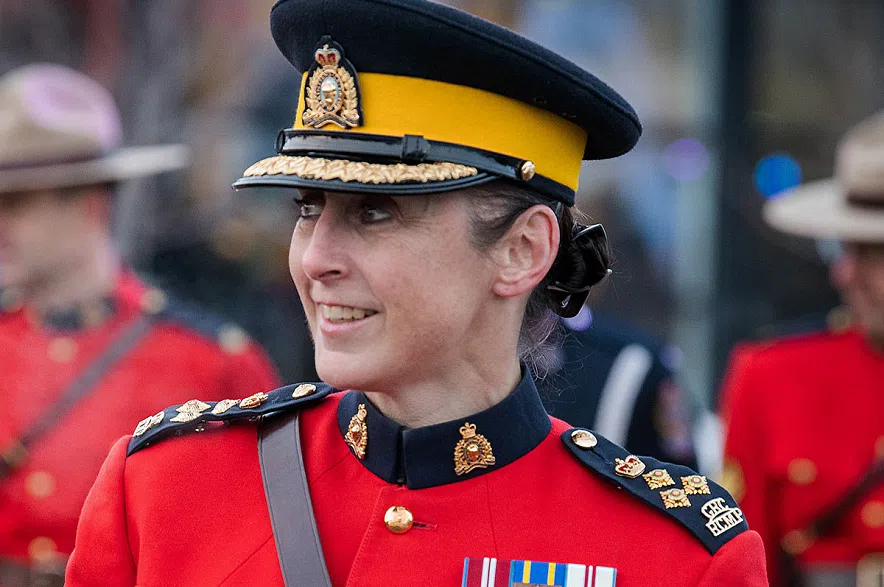Just like his finance minister, Premier Scott Moe wishes the 2024-25 provincial budget unveiled on Wednesday didn’t have a deficit attached.
But, Moe said, there’s a need for new schools and a need for improvement and expansion in health care, which he called the challenges of growth.
READ MORE:
- What you need to know about Saskatchewan’s provincial budget
- Thousands of teachers pack the picket lines on Saskatchewan budget day
- Saskatchewan NDP gives provincial budget a failing grade
- Saskatchewan pre-election budget pitches record spending, $273M deficit
“We embrace them, but nonetheless they are challenges, and we are taking some of the cash that we have as a government – only due to the strength of our economy – (and) putting that towards building some of this infrastructure that is needed,” said Moe.
The premier pointed to a new joint-use high school for Saskatoon, which has expanded during the planning phase to house about 3,500 students. That’s not something that would have been considered 15 years ago, Moe said, and it shows how quickly Saskatchewan’s population is growing.
The deficit forecast in the provincial budget is $273 million, with record spending increases in areas like education, health and municipal revenue sharing.
Moe justified the increased spending in a year when his government is running a deficit by saying those services are what Saskatchewan people are asking for and what they expect.
Though the budget is not balanced, the premier spoke about finding a balance within it.
“(We’re seeking) a balance between some of the most significant investments in health care, in our classrooms, and in our communities, and trying to preserve the ability for us to keep life as affordable as we can in Saskatchewan,” said Moe.
The province’s operating debt isn’t being added to, but the gross debt is expected to go up by $3 billion. Moe said that was basically all due to government and Crown capital expenses, which he compared to borrowing money through a mortgage when buying a house.
“As we grow as a province and as we need to build out our services, we need to ensure that we’re doing it in a sustainable fashion financially,” Moe said.
The premier said the government’s forecast is predicting a surplus in the 2025-26 fiscal year and beyond, though Moe’s government has said that before.
There is a provincial election expected in the fall, but Moe seemed to reject the notion that the budget might have some bearing on the vote. The premier said a budget is about governance and balancing priorities, while an election is about choice.
While the Saskatchewan NDP and the teachers’ union were quick to condemn the budget, other reactions were mixed.
CUPE president calls for more recruiting measures
The government is touting the record amount invested into health care this year, but Bashir Jalloh, president of CUPE 5430, said not all of that money is going to the right places, especially when it comes to workers.
Health gets the largest portion of the overall budget, with $7.6 billion set aside. Of that total, $4.7 billion is going to the Saskatchewan Health Authority.

Bashir Jalloh, president of CUPE health care workers 5430, speaks to media in Regina after the budget was tabled. (Lisa Schick/980 CJME)
The budget also included $574 million to fund programs and services for those struggling with mental health and addictions. That’s more than seven per cent of the total health-care budget, and the province’s largest-ever investment in that area.
Jalloh said he’s concerned not enough is being put towards recruiting and retaining health-care workers.
“Last year, when we were coming here, our job vacancy average was about 1,100 to 1,200. Today it’s 1,600, 1,700 (or) 1,800,” he said.
“The government should engage with people who are on the front lines to work with this. We have provided short-term, medium-term and long-term goals in terms of recruitment and retention, but our focus has always been reaction.
“We are spending a lot of money trying to be reactive and less focused on retention. I would say focus on retention and keep people in this province, and then that way we know our health care is in good hands.”
CFIB pleased with small-business tax break
The Canadian Federation of Independent Business was happy to see no new taxes in the budget, and an extension of a tax reduction for small businesses that continue to battle inflation.
The reduction in Saskatchewan’s small business tax – to one per cent – will be extended until June of 2025, the government announced in Wednesday’s budget.
“For small businesses who are struggling to keep up with rising costs, this tax break will be welcome news,” said Brianna Solberg, the federation’s director of provincial affairs.
“I know when we’re talking about one or two per cent it might seem minor, but for small businesses earning $500,000 in income, that’s the difference between $5,000 and $10,000 in corporate taxes,” Solberg explained.
“For small businesses, to avoid having their corporate tax doubled this year is going to be a huge break.”
Solberg said small businesses have seen all of their costs going up recently due to high inflation, including gas and utilities.
“Any affordability measures would be greatly appreciated, and this tax cut for small businesses will make a huge difference,” Solberg said.
Canadian Taxpayers Federation wants to see balance
Greg Haubrich, prairie director for the Canadian Taxpayers Federation, said he wasn’t pleased to see a deficit budget.
“It’s honestly very disappointing to see the Saskatchewan government fail to balance the budget again. I was here last year when the minister stood up and said that we were going to have a $1-billion surplus. That turned into a deficit. At least they have the common courtesy this year to tell us that they’re going to be overspending,” Haubrich said.
According to Haubrich, interest payments on Saskatchewan’s debt will add up to $730 million in the year ahead, which he said could otherwise be spent on tax relief or additional services.
“You can hire 7,000 nurses or 7,000 teachers with that money. But instead, because the government has failed to balance the budget in the past and is continuing to do so today, we’re not getting anything for that money,” he said.
Saskatchewan RCMP says more money needed
Assistant Commissioner Rhonda Blackmore, commanding officer of the Saskatchewan RCMP, said she was pleased to see $228 million in the budget to fund RCMP operations, along with $21.6 million for the Mounties’ First Nations policing program.
But, she added, more money will be needed to help with operations in the province.
“We’re happy to see some money coming to the RCMP. You know, there’s certainly additional funds that are needed to deal with operations, but it’s a great start,” Blackmore said.

Rhonda Blackmore says more funding will be needed to support the Saskatchewan RCMP’s operations. (Saskatchewan RCMP/Twitter)
“And the other really optimistic piece for myself is the fact the minister has committed to funding additional positions outside of the budget that was given to us today, and so with those additional positions that they’re willing to fund, as long as we can fill them, I think that’s really big for us.”
Blackmore was clear that more money will be needed further down the road, as police are going through the same financial challenges many businesses are facing.
She said fuel costs are going up, but the province’s Mounties are still responsible for policing 651,000 square kilometres. Investigations are also becoming more complex and more costly.
“We’re seeing pressures just like everyone else, and so additional funds are needed for operations within the RCMP,” Blackmore said.
The budget included $7 million for the Saskatchewan Marshals Service, which is expected to begin operations in 2026. Blackmore said she’s not worried about that part of the budget as long as it isn’t taking away from the RCMP’s share of the funding.
“As long as the RCMP is seeing funding increases and resource increases, that’s where my focus really is,” she said.
“If the marshals are being funded in addition to funding that’s coming to the RCMP, that’s what’s important to me.”
– With files from 650 CKOM’s Lara Fominoff, Will Mandzuk and Shane Clausing







